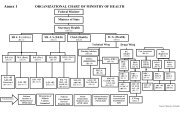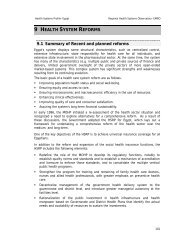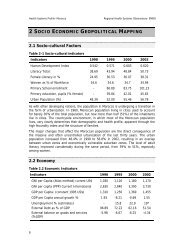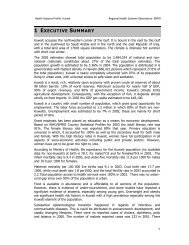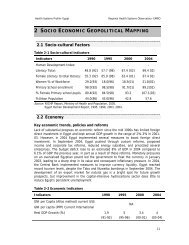The role of contractual arrangements in improving health sector ...
The role of contractual arrangements in improving health sector ...
The role of contractual arrangements in improving health sector ...
You also want an ePaper? Increase the reach of your titles
YUMPU automatically turns print PDFs into web optimized ePapers that Google loves.
Lebanon<br />
commonly miss<strong>in</strong>g. In such a situation, expos<strong>in</strong>g equity-sensitive deficiencies <strong>of</strong> knowledge,<br />
attitudes, practices by contract<strong>in</strong>g partners, and areas where data needs to be collected, become<br />
important <strong>in</strong> itself and this has been the approach taken here.<br />
Many <strong>of</strong> the major determ<strong>in</strong>ants <strong>of</strong> <strong>health</strong> lie outside the <strong>health</strong> <strong>sector</strong>. Choices and<br />
contents <strong>of</strong> <strong>contractual</strong> <strong>arrangements</strong> are directly affected by the positions <strong>of</strong> regulat<strong>in</strong>g bodies<br />
(i.e. government) on the relevance <strong>of</strong> broad determ<strong>in</strong>ants to <strong>health</strong> and <strong>health</strong> <strong>sector</strong><br />
performance. Such determ<strong>in</strong>ants are rarely reflected, however, <strong>in</strong> discussions <strong>of</strong> <strong>contractual</strong><br />
<strong>arrangements</strong>. Analyz<strong>in</strong>g <strong>contractual</strong> <strong>arrangements</strong> <strong>in</strong> light <strong>of</strong> sociopolitical determ<strong>in</strong>ants<br />
requires understand<strong>in</strong>g <strong>of</strong> the performance <strong>of</strong> the Lebanese economy and social and political<br />
organization. While such a broad analysis may be beyond our focus, they constitute the context<br />
with<strong>in</strong> which <strong>contractual</strong> <strong>arrangements</strong> must be understood. As such, an attempt must be made to<br />
br<strong>in</strong>g these perspectives <strong>in</strong> discussions <strong>of</strong> <strong>contractual</strong> <strong>arrangements</strong>. <strong>The</strong> Report attempts to do so<br />
<strong>in</strong> a modest way.<br />
If “<strong>health</strong> <strong>sector</strong>” is <strong>in</strong>terpreted broadly to mean “<strong>health</strong> system”, then <strong>contractual</strong><br />
<strong>arrangements</strong> must be evaluated <strong>in</strong> a much broader context. This would necessitate evaluation <strong>of</strong><br />
how <strong>contractual</strong> <strong>arrangements</strong> relate not only to <strong>health</strong> care delivery but also to performance <strong>of</strong><br />
other, broader, components <strong>of</strong> the <strong>health</strong> system, such as nutrition and basic social services.<br />
Because this endeavour is potentially complex and very wide <strong>in</strong> scope, limited reference is made<br />
to <strong>health</strong> system issues beyond care delivery.<br />
While there are opportunities to improve the use <strong>of</strong> <strong>contractual</strong> <strong>arrangements</strong> as a tool,<br />
recommendations for so do<strong>in</strong>g cannot be separated from the broader issues <strong>of</strong> <strong>health</strong> <strong>sector</strong><br />
reform <strong>in</strong> Lebanon. A detailed consideration <strong>of</strong> <strong>health</strong> <strong>sector</strong> reform <strong>in</strong> Lebanon is beyond the<br />
focus <strong>of</strong> this report. However, an attempt is made to contextualize recommendations for<br />
improv<strong>in</strong>g use <strong>of</strong> <strong>contractual</strong> <strong>arrangements</strong> <strong>in</strong> relation to previously made recommendations for<br />
<strong>health</strong> <strong>sector</strong> reform <strong>in</strong> Lebanon.<br />
Consider<strong>in</strong>g the sheer number and breadth <strong>of</strong> <strong>contractual</strong> <strong>arrangements</strong> <strong>in</strong> Lebanon, there<br />
are multiple ways <strong>of</strong> classify<strong>in</strong>g and summariz<strong>in</strong>g these <strong>arrangements</strong>. This can be done<br />
accord<strong>in</strong>g to which agency is <strong>in</strong>volved (e.g. MOPH or NSSF), contracted party (e.g. hospitals,<br />
primary care centres, or other parties), types <strong>of</strong> service provided (e.g. hospitalization versus<br />
outpatient services), or other criteria. In this Report, an attempt was made to provide <strong>in</strong>sights <strong>in</strong>to<br />
<strong>contractual</strong> <strong>arrangements</strong> from different angles to enhance understand<strong>in</strong>g <strong>of</strong> the complexity <strong>of</strong><br />
the issues. A mixed approach is taken <strong>in</strong> which contracts are briefly mentioned accord<strong>in</strong>g to the<br />
different governmental agencies <strong>in</strong>volved, while case studies <strong>in</strong>vestigate specific aspects <strong>of</strong><br />
service delivery.<br />
F<strong>in</strong>ally, an attempt is made to proceed beyond identification <strong>of</strong> problems <strong>in</strong>to recogniz<strong>in</strong>g<br />
aspects <strong>of</strong> good performance and opportunities for improv<strong>in</strong>g performance.<br />
150





